-
Can regular dental cleanings help with your lungs?
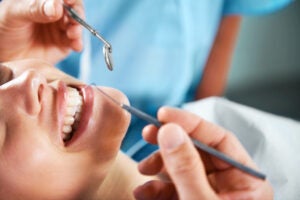
You’ve no doubt heard that seeing your dentist regularly is important for your health. Not only do twice yearly dental cleanings reduce your risk of tooth decay, cavities, and gingivitis, but they also protect against problems like cardiovascular disease. But what do dental cleanings have to do with your lungs? According to a recent study, your trips to the dentist could have a major impact on your respiratory system.
What’s the connection between dental cleanings and the lungs? When bacteria spreads to your lungs, this can result in lung infections. There are two ways bacteria can enter the lungs. The first is through inhalation. Saliva droplets are carried in and out of the mouth as we breathe, and bacteria in the saliva can enter your lungs. Most of the time, this isn’t a problem, because the immune system can protect you against becoming ill. However, if your oral health is poor and your immune system is overworked because of it, the lungs can become inflamed. The other route for bacteria to enter the lungs is through the bloodstream. If your mouth is unhealthy and gum disease is breaking down your gum tissues, the damaged tissue can allow bacteria to enter the bloodstream, causing inflammation throughout the body.
The study was authored by Dr. Michelle Doll, assistant professor of internal medicine in the infectious disease division at Virginia Commonwealth University. In the course of the research, the records of over 26,000 people were reviewed. Researchers found that, of the subjects studied, those who never sought dental care were 86 percent more likely to contract bacterial pneumonia than people who had twice yearly dental checkups. Routine preventive dental care, including caring for teeth at home through brushing and flossing as well as having regular dental exams and cleanings, is an important part of protecting against this kind of infection.
About one million Americans contract pneumonia each year, and about 50,000 of those people die from it. Pneumonia can affect anyone, but it’s more common- and more dangerous- in older people and people with lung conditions or autoimmune disease. While it’s impossible to keep all bacteria out of the lungs, it’s good to know that you can help protect yourself from pneumonia and other diseases by practicing good oral hygiene and seeing your dentist regularly.
Whether you need a cleaning, specialty oral healthcare, or just good dental advice, choose the practice that was voted best dentist in NYC! At Park 56 Dental Group, we offer pediatric, prosthodontics, endodontics, oral surgery, Invisalign®, emergency, and sedation dentistry, all at the highest level of treatment. We serve the Midtown, Central Park, Upper East Side, Park Avenue, and all surrounding Manhattan and New York areas, with a patient-centered practice that has hours to fit your schedule. Schedule your complimentary consultation today by contacting us online or calling us at (212) 826-2322.
-
How Acid Reflux Can Ruin Your Teeth

Heartburn is a common complaint, but if you’re experiencing heartburn or acid indigestion on a daily basis, you may be suffering from Acid Reflux, also known as GERD, Gastroesophageal Reflux Disease. GERD happens when the muscles of the esophagus relax and let stomach acids flow upward, sometimes into the mouth. As the condition progresses, the esophageal lining becomes corroded. It’s very uncomfortable, causing the burning sensation of heartburn. But have you ever considered that acid reflux could be damaging your teeth?
Some of the symptoms of GERD include not only heartburn, but also difficulty swallowing, a burning sensation in the mouth, a sore throat and regurgitation. A person with GERD may experience nausea, vomiting, belching, and chronic coughing. Stomach acid that reaches the mouth can also cause erosion of tooth enamel, tooth sensitivity, chipping and discoloration of teeth, and bad breath.
You probably already know that acid is bad for your tooth enamel. Oral acid, which is usually produced by bacteria, foods, and beverages, can dissolve the minerals in enamel, causing erosion and decay. Stomach acid is extremely strong, with a pH of 2.0 or less, so it can cause even worse damage to the enamel, leaving teeth yellowed, pitted, and sensitive.
What can you do to keep GERD from ruining your teeth? Talk to your doctor about managing your symptoms. You might need medication, and your doctor may recommend some lifestyle changes. These include:
- Avoiding trigger foods like chocolate, tomato-based foods, alcohol, coffee, and spicy or greasy foods.
- Quitting smoking.
- Not eating for several hours before bed.
- Losing weight.
- Not wearing tight clothing.
You can also lessen the effects of acid in your mouth. This can be done by stimulating saliva production by drinking water, taking a saliva booster, or chewing gum. You can also help neutralize acid by rinsing with plain water or a cup of water mixed with ½ teaspoon of baking soda. Antacid tablets can also help balance the pH of your mouth.
Your dentist can also help. Fluoride can strengthen your enamel, and your doctor can apply topical fluoride or prescribe a special rinse that has a higher fluoride concentration than you can get over the counter. Seeing your dentist twice a year allows the condition of your enamel to be evaluated, and your dentist can catch and treat problems while they’re still minor.
If you’re looking for a dentist in New York, choose the practice that was voted best dentist in NYC! At Park 56 Dental Group, we offer pediatric, prosthodontics, endodontics, oral surgery, Invisalign®, emergency, and sedation dentistry, all at the highest level of treatment. We serve the Midtown, Central Park, Upper East Side, Park Avenue, and all surrounding Manhattan and New York areas, with a patient-centered practice that has hours to fit your schedule. Schedule your complimentary consultation today by contacting us online or calling us at (212) 826-2322.
-
Why You Should Invest in Your Dental Health

Hey! Yes, you! You matter! Let’s talk about an important way to show your body that you care!
Yep! We’re talking about your dental health and, in turn, your overall wellbeing! Your mouth is there for you to help with communicating, both verbally and non-verbally, breathing, and eating. Your confidence is conveyed through the communications that start from your mouth, including both your teeth and your smile! It is quite difficult to imagine living without a functioning mouth!
Did you know that your oral hygiene and dental health practices impact your entire body? In fact, many health problems, including oral health, are preventable just by intentionally caring for your teeth! So, let’s dive in and see why it is worth your time to invest in your dental health!
- Daily Habits are Healthy Habits
Plaque build-up is a leading cause in gum disease which leads to heart disease, cancer, and other illnesses. Flossing, brushing, and using antibacterial mouthwash are simple daily habits that can prevent not only cavities but also gum disease and other illnesses.
Check out this fact: The U.S. Centers for Disease Control (CDC) estimates that 31.6% of adults between the ages of 20 and 44 currently have untreated cavities AND that 46% of adults over the age of 29 already have gum disease. While this is shocking news, matters are made worse by the fact that this is preventable by employing simple daily oral health routines.
- Your Overall Health
Proper hygiene habits and a nutritious diet benefit not just your teeth and gums but your entire body’s health and wellbeing. Preventing gum disease can lead to reducing the risk of other complications, including heart disease, certain types of cancer, respiratory problems, kidney disease, joint inflammation, and even diabetic complications.
Having healthy daily habits is important AND so is keeping routine dental visits a priority. Just like you go to doctors for other annual check-ups, it is extremely important to visit your dentist every 6 months for routine cleanings, x-rays, and check-ups. Just remember, prevention is WAY easier than treating a problem that does arise! Besides, consistent proper care is FAR more comfortable (and affordable) than treating problems that do arise!
- Your Teeth Are Worth Your Investment
Daily habits, such as flossing, brushing and using mouthwash, most definitely help with caring for your teeth and oral hygiene. It is also very much worth your time and money if you see a dentist regularly, every 6 months, for a full cleaning and exam. Look at this cost and prevention as an investment in critical resources rather than “just another expense” because the pain of dental problems and payment for their repairs can be mostly avoidable.
At Park 56 Dental, we are dedicated to safely and comfortably helping you care for your smile. Our talented staff are compassionate about our services. Contact us today to make an appointment and invest into the quality and caring of and for your smile! So, what are you waiting for? Contact us today to schedule an appointment at (646)679-3989!
-
Why You Should Choose Invisalign to Help Give You A Healthier Smile

When you think of a beautiful smile, what do you think of? Straight teeth! When you look at your own smile, is there something you wish you could change? Straight teeth are actually easier to attain than you’d think! Let the certified Invisalign experts at Park 56 Dental of NYC help you know how easy Invisalign actually is!
What is Invisalign?
Invisalign is a modern method of straightening teeth without the hassle and diet restrictions of braces. Because the aligner is designed to be removed, it is easier to maintain healthy daily oral hygiene habits that your whole mouth will benefit from! A typical process is completed between 9 and 15 months of wearing the aligners 24 hours a day, other than when brushing, eating, drinking or flossing.
What are the health benefits of having straight teeth?
Straight teeth are more than just a visual bonus. The American Dental Association says that properly spaced teeth can prevent periodontal disease (red, swollen gums) as well as other periodontal related issues. Additionally, the ability to remove the aligner while under treatment with Invisalign allows for better/ easier access to your mouth so that there isn’t as much risk for mouth sores, hidden food getting stuck between wires or brackets, plaque and tartar build up, or other daily challenges that braces can present.
Why is Invisalign for me?
Invisalign is effective at straightening crooked teeth with many, many benefits, such as:
- Convenient
- Removable, so you are able to keep your teeth and your aligner clean!
- Free to eat and drink your preferred food choices without concern for damaging, as with braces
- Virtually invisible (Ha! That’s why they’re called “Invisalign!”)
- So comfortable, you hardly know they’re there!
- Easier to clean
- Versatility
- Game ready! No wires= NO mouth guard needed with an Invisalign!
- Produces amazing results quickly
- Fewer visits to the dentist are needed (as compared to braces)
What will Invisalign cost?
Remember, when caring for your teeth, you are making an investment in YOU and your overall health! The price of Invisalign treatment varies, depending on duration of treatment. Additionally, if your insurance includes orthodontic treatment, you may qualify for Invisalign. Park 56 Dental also has payment options so that you may choose a plan that works best for you.
What do people say about Invisalign?
Testimonials are a great resource for making a decisions. Here are a few testimonials from Park 56 Dental Invisalign patients.
I definitely smile a lot more. Even though I’m still in treatment, it has given me more confidence. It’s given me something to look forward to. I feel good about myself. I feel good that I have taken the steps to get these braces. ~Daniel, age 38
I always wanted to have straight teeth, but never thought my smile would look this great. Plus, no one even knew when I was wearing them. I couldn’t be happier! ~Gina, age 26
More than 1,000,000 patients worldwide have been treated with Invisalign and the number continues to climb! If you’re curious about Invisalign, don’t hesitate to set up a consultation with the certified Invisalign providers at Park 56 Dental of NYC and schedule a consultation today at (646) 679-3989!
-
The Link Between Your Oral Health and Alzheimer’s
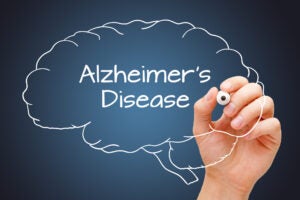
It seems far-fetched to say that your oral health and Alzheimer’s disease could possibly be connected. However, this is exactly the claim that research is beginning to suggest.
As research has been done to compare the brains of people with and without Alzheimer’s disease, scientists have discovered that individuals who suffer from Alzheimer’s disease have an increase in levels of certain bacteria that are also responsible for the cause of gum disease, such as porphyromonas gingivalis and a toxic enzyme that it creates called gingipains. Gingipains is secreted from this bacteria and has been found to destroy the brain’s neurons. This similarity between gum disease and Alzheimer’s is enough to suggest that the prevention of gum disease may also be connected to the possible prevention of Alzheimer’s
In a different study led by the CDC’s National Center for Health Statistics, baselines were taken and individuals were tracked with follow-up data kept for up to 26 years. Up to 19 antibodies were found that are associated with Alzheimer’s with the most fatal being, again, porphyromonas gingivalis and its production of the toxic enzyme gingipains.
So, it makes sense to work hard to prevent gum disease and, therefore, reduce the risk of MANY other problems!!
What do I do if I already have gum disease?
Healthy oral hygiene habits can decrease the risk of gum disease. Continue to improve and maintain healthy habits, including:
- flossing daily
- brushing your teeth 2-3 times a day
- using antibacterial mouthwash
- changing your toothbrush every 3 months
- being intentional about what foods and drinks you comsume
Remember, also, to visit your dentist at least 2 times a year for cleanings. If your teeth are showing signs of plaque build-up, there is a procedure for deeper cleaning of the teeth and gums that may be right for you. Continuing to care for your teeth is of the utmost importance. Your health and wellbeing are so valuable, especially to those whom you love!
How can I protect myself?
Keep learning and researching! Education is the key to making informed and improved decisions. Some of your health journey is genetic, but some is left up to you and the choices that you make for taking care of yourself. You may not be able to change past decisions but you can certainly work toward staying the healthiest you can possibly be. Whether you have always been on top of your oral health and hygiene or you have room for improvement, remember that your teeth and gums impact your whole body’s wellness.
While this research is still undergo, you have the ability to be proactive. Clean teeth make for a healthier you! Stay informed and maintain that amazing smile! Schedule a cleaning today so that you can maintain healthy teeth, heart, and mind!
You are worth the time, energy, and expense of a happy, healthy smile! So, go ahead and take some much needed time to invest in yourself and your future! You’ll be so very glad that you did!!! Call Park 56 Dental today at
-
Healthy Dental Habits
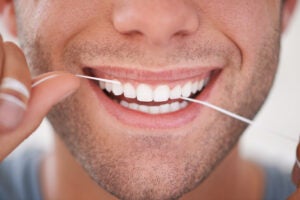
Your smile says it all! But what exactly does it say? Dental hygiene is not just important for a great smile, it also contributes to your body’s overall health. Caring for your teeth can decrease risks of gum disease, heart disease, dementia, respiratory problems, and even cancer. Risk prevention is easier than you think if you follow these simple habits to develop healthy hygiene.
Brush Your Teeth 2-3 Times Daily
Using the right toothbrush and fluoride toothpaste will prevent food from getting stuck between your teeth as well as plaque build-up, which can lead to bad breath, cavities and gum disease. Brushing morning and night are common habits, but brushing after each meal may also help with build-up, preventing gum disease and bad breath. It is recommended to brush in a circular motion for 2-3 minutes and cover each section of your mouth so that each tooth has been properly noticed.
In addition to brushing, choosing the right toothbrush is also important. Whether you are choosing an electronic toothbrush or a regular tooth brush, make sure that you are replacing it (or the head, with an electronic toothbrush) every 3 months to reduce the amount of bacteria growing and potentially causing harm.
Flossing
Be honest! It is easy to answer your dentist or hygienist with a false and emphatic, “Yes!” when asked if you’ve been flossing. However, you know the truth and your body does, too. It is a beneficial habit to floss your teeth daily. This routine cleaning provides even more care for removing food from between your teeth and prohibiting harmful growth of plaque or allowing cavities to form. Bleeding gums when you floss can indicate gingivitis or even a lack of healthy gums but this can improve over time, so stick with it! If flossing is something that your sensitive teeth have difficulty tolerating, try a water pick instead.
Whether you are choosing floss or a water pick, make sure that you are working to dedicate time to developing healthy dental hygiene habits so that your next dental visit can be an honest one!
What More Should You Do?
Other suggestions for healthy oral hygiene include brushing your tongue and even using an antibacterial mouth wash. Tongue scrapers can be purchased and can help with removing bacteria from your tongue and improving your breath. Antibacterial mouth wash can be the final touch to your daily routines and can help remove any bacteria that may have been able to hide from your toothbrush or floss.
Now your daily oral hygiene habits are off to a sparkly, fresh start. What other habits should you let go of?
There are some bad habits that are actually more than just indulgences. What you put into your mouth and body impacts your whole body’s health. So, take care of you and your mouth!
- Limit coffee, tea and coke and drink with a straw to prevent the harmful acids from settling onto your teeth.
- Say NO to tobacco! No smoking or chewing tobacco!
- Eat a nutritious diet of fruits, vegetables, fish, and chicken to encourage healthy teeth but also a healthy body overall!
- Limit sugary foods! The harmful bacteria in your mouth gets fuel from sugary foods and drinks. By limiting what you eat you are promoting a healthier mouth.
Now that you are ready to focus on a more complete oral hygiene regiment, make sure that you also schedule dental appointments regularly to assist with preventative care and a positive care plan that will impact your whole body! At Park 56 Dental, we are here to serve you! Give us a call at (646) 679-3989.
-
8 Bad Habits That Ruin Your Dental Health
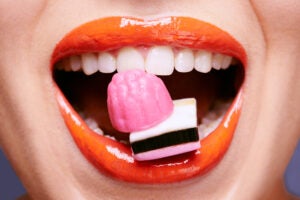
Are you looking for ways to take better care of your smile? It’s easy to focus on things you should do, like brush morning and night, floss once a day, and visit your dentist for a professional cleaning every six months. But what about the things you shouldn’t do? Here are eight bad dental health habits that you need to break right now.
- Chewing on ice or hard candy: Munching on the ice cubes at the bottom of your drink may seem harmless, but this habit can damage your teeth if you bite down wrong. Chill your beverage before serving it to avoid needing ice, or drink from a straw to reduce the temptation to chew.
- Biting your nails or chewing on pens: These bad habits introduce harmful germs into your mouth, damage your teeth, and lead to jaw dysfunction. If you want to stop biting your nails, try wearing bitter-tasting nail polish.
- Using your teeth as tools: Never use your teeth to open packages, undo knots, tear tape, or open bottles. Instead, find the right tool for the job, such as scissors or a bottle opener.
- Constantly snacking or sipping on sugary drinks: Eating nonstop keeps your teeth in constant contact with food particles, increasing the risk of cavities. This habit is even more problematic if your snacks or drinks have high sugar content. The solution is to eat balanced meals so you aren’t tempted to snack all day. Then, reach for water instead of juice, soda, or sports drinks.
- Brushing too hard: Aggressive brushing can wear down tooth enamel and irritate your gums. To avoid these problems, choose a soft-bristled toothbrush and focus on gently massaging your teeth, not scrubbing them raw.
- Playing contact sports without a mouthguard: It only takes one hit to the mouth to chip, break, or even lose a tooth. You might also bite your cheek or tongue. To protect your teeth and soft tissues, ask your dentist about creating a custom mouthguard.
- Grinding your teeth: Stress can cause nighttime tooth grinding, or bruxism, a habit you have little control over. If you think you grind your teeth in your sleep, the best solution is to wear a special nighttime mouthguard your dentist makes just for you.
- Smoking or chewing tobacco: Using tobacco products of any kind stains your teeth, causes gum disease, and increases the risk of oral cancer. Save your dental health—talk to your dentist for tips to quit smoking
At Park 56 Dental, we know it can be hard to break bad oral health habits. But just a few small changes can go a long way toward preserving your smile! For more tips or to schedule your next dentist visit, feel free to get in touch. We’ve been voted the best dentist in New York, with over 20 years of experience serving the 10022 zip code area. Call us at (212) 826-2322 or contact us online to speak with our NYC dentist today.
-
Why it’s Important to Replace a Lost Tooth
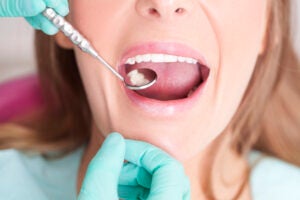
Many people assume that a missing tooth only has cosmetic consequences. But while having a gap in your smile is enough to make anyone self-conscious, there are also numerous health-related reasons not to ignore a missing tooth. Whether you opt for a bridge, removable partial dentures, or a dental implant, here’s a look at why it’s important to replace a lost tooth.
- Your teeth may shift and loosen: Every tooth helps maintain the stability of the one next to it. If you lose a permanent tooth, the surrounding teeth may begin shifting to fill the gap, undoing years of orthodontic work.
- Chewing may be more difficult: The sensitive gum tissue where your tooth is missing can make it painful to chew in that part of your mouth. Then, if your teeth drift out of place, your bite may suffer, making chewing even more uncomfortable. Over time, you may find it cumbersome to eat solid, healthy food like fruits and vegetables, which can lead to poor nutrition.
- You could develop TMJ disorder: To avoid discomfort, you may start chewing food on only one side of your mouth. However, this can strain your jaw muscles and lead to temporomandibular joint (TMJ) disorder, resulting in jaw pain, chronic headaches, and other symptoms. Lopsided chewing can also wear down your teeth unevenly and affect their appearance.
- You may be more prone to cavities and gum disease. A shifting smile and altered bite can make your teeth harder to clean. This means you’re more vulnerable to tooth decay and gum disease, both of which may lead to further tooth loss.
- Your jaw bone could deteriorate: A healthy jaw is only possible if you have healthy teeth to stimulate the production of new cells. If you lose one or more teeth, this stimulation disappears, which can lead to bone loss.
- Your appearance could change: When your opposing teeth have nothing to make contact with, your muscles and bone structure may begin to change. This problem is most apparent if you lose several teeth, which can lead to sunken cheeks and an aged appearance.
- Your self-esteem could suffer: Losing baby teeth may have been fun as a kid, but having a gap in your smile as an adult can drain your confidence level. First, you become concerned with your appearance and cover your mouth when you smile. Then, you may avoid talking too much if you develop a speech issue. Depression and anxiety can set in as a result.
If you recently lost a tooth in a traumatic incident or had a decayed tooth extracted, visit Park 56 Dental to explore your tooth-restoration options. We recommend dental implants to many of our patients because they provide a hassle-free, long-lasting way to replace a lost tooth. Even if you didn’t qualify for an implant in the past, you may now be eligible. To find out what makes us the best dentist in New York, please call us at (212) 826-2322 and schedule a consultation.
-
Why Do Dentists Encourage You to Have Your Wisdom Teeth Removed?
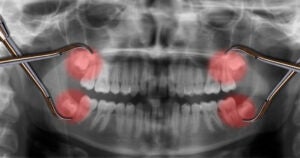
The human mouth goes through numerous changes over the years. For many people, one of the most memorable milestones is the appearance of the third molars around ages 17 to 21. “Wisdom teeth” are so named because they are the final teeth to appear and come in at a mature age.
When wisdom teeth erupt through the gums correctly, they can help with chewing. However, while there’s no definitive rule, most people have their wisdom teeth removed. Why is this? And how do you know if you should keep your wisdom teeth or not?
Many situations warrant having your wisdom teeth removed. Here are the most common reasons your dentist may encourage you to make this choice.
Fully Impacted Wisdom Teeth
An impacted tooth fails to erupt through the gums, meaning it remains covered by gum tissue. This may occur if your mouth is too small for the tooth to emerge. Dentists usually recommend removing impacted wisdom teeth because trapped bacteria could cause painful cysts or abscesses to form.
Partially Impacted Wisdom Teeth
A partially impacted tooth erupts partway through the gums. Dentists almost always advise removing wisdom teeth in situations like this. After all, the partial eruption makes it easy for bacteria to get inside, leading to swelling, pain, and stiffness in the jaw. Tooth decay is also more likely because it’s difficult to clean a partially impacted tooth.
Overcrowding
Some willful wisdom teeth erupt fully, even if there isn’t room in the jaw. This can overcrowd your mouth and damage neighboring teeth. Your entire smile may even shift, throwing off your bite and causing jaw pain.
Necessary for Your Dental Care Plan
Your dentist may recommend wisdom teeth extraction as part of your overall oral care plan. For instance, if you’re planning to get braces soon, it’s wise (pun intended) to remove problematic wisdom teeth before you begin straightening your smile. And if your wisdom teeth come in after having braces, prompt removal prevents them from undoing all your hard work.
Other Problems
If you decide to keep your wisdom teeth for now, continue to monitor them for signs of trouble. It may become necessary to remove them if issues develop near your wisdom teeth, such as:
- Tooth, jaw, or cheek pain
- Repeated infections
- Gum disease
- Extensive tooth decay
The decision to remove your wisdom teeth isn’t always straightforward. That’s why it’s important to visit the dentist regularly. Routine oral exams and X-rays reveal what’s happening in your mouth so you can take the best course of action for your oral health.
If your wisdom teeth are giving you trouble, visit Park 56 Dental for a consultation. We offer compassionate, high-quality dentistry in the 10022 zip code area of NYC, and we’re confident we can help you make the right choice regarding your wisdom teeth. If you decide to have them extracted, rest assured that we offer sedation dentistry to make you feel more comfortable. Call us at (212) 826-2322 to set an appointment today.
-
Why Your Gums Hurt When Brushing Your Teeth
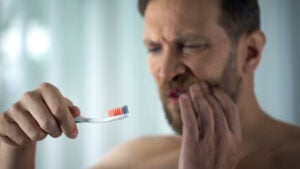
Do your gums hurt when you brush and floss? Is there blood in your toothpaste when you spit into the sink? This usually means one of two things—either you’re being too rough when you brush and floss, or you’re developing gum disease. To rule out other more serious problems, be sure to visit your dentist. Otherwise, explore these solutions to help prevent your gums from hurting when you brush your teeth.
When Your Gums Hurt Because of Rough Brushing and Flossing
It’s easy to brush too hard when you’re trying to be thorough. However, you can easily irritate your sensitive gum tissue if you scrub aggressively. Here’s how to clean your teeth while protecting your gums:
- Use a soft-bristled toothbrush.
- Brush in gentle, circular motions.
- Consider switching to an electric toothbrush.
- When flossing, follow the curve of your teeth and avoid snapping the floss against your gums or using a sawing motion.
When Your Gums Hurt Because of Gum Disease
Mild gum disease, known as gingivitis, starts when a sticky film of bacteria called plaque builds up along the gum line. Ignoring gingivitis can lead to periodontal disease and, eventually, severe periodontitis. If your gums are swollen, red, irritated, and hurt when you brush, talk to your dentist about starting treatment.
Other Reasons Why Your Gums Hurt
There are many other potential causes of painful gums, including:
- Canker sores
- Tooth abscesses
- Tobacco use, including cigarettes, vaporizers, and chewing tobacco
- Hormonal changes during puberty, menstrual cycles, pregnancy, and menopause
- Thrush, a type of yeast infection
- Ill-fitting oral devices, including braces, retainers, dentures, and mouthguards
- Chemotherapy drugs
How to Sooth Sore Gums
In addition to brushing and flossing more gently, treating gum disease, and tackling other causes of painful gums at the source, try these tips to soothe your sore gums:
- Rinse your mouth with warm saltwater.
- Rinse with mouthwash containing hydrogen peroxide.
- Take over-the-counter pain relievers.
- Apply numbing gel to the tender area.
- Avoid spicy or acidic foods to avoid further irritation.
- Eat yogurt with live cultures to balance the bacteria in your mouth.
Discuss Your Symptoms with Your Dentist
If your gums hurt or bleed for over a week, and your attempts to treat the problem at home aren’t working, it’s time to contact your dentist. A professional teeth cleaning can remove the stubborn plaque irritating your gums. Your oral hygienist may also perform a deep-clean called root planing and scaling if you have gum disease.
Don’t ignore painful gums—stop by Park 56 Dental in NYC to discuss your symptoms with our dentist. We can examine your gums and teeth and recommend the proper treatment. Our office has been voted the best dentist in New York, with over 20 years of experience serving the 10022 zip code area, so you can trust us to take great care of your smile! Call us at (212) 826-2322 to set an appointment today.
RECENT POSTS
categories
- Uncategorized
- Cosmetic Dentistry
- Veneers
- Healthier Teeth
- Teeth Whitening
- Dental Health
- Video
- Dental Emergencies
- Invisalign
- Dental Implants
- Root Canal
- Sedation Dentistry
- Infographic
- Dental Crowns and Bridges
- Dental Anxiety
- Gum Disease
- COVID-19
- Bad Breath
- New York Dentist
- Cut out sugar
- General Dentistry
- Oral Health
- Oral Cancer
- Dry Mouth
- Gum Health
- Toothache
- Dental Sealants
- Cavities



